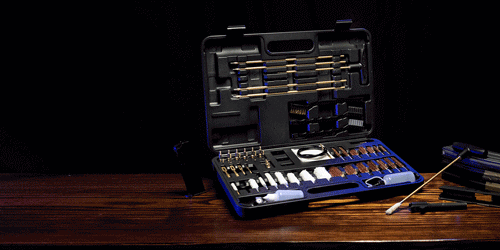The Ultimate Hunting Checklist for Beginners
Embarking on your first hunting trip can be both exciting and overwhelming. Having the right gear, knowledge, and preparation can make all the difference between a successful outing and a frustrating experience. Here’s the ultimate checklist to help beginners ensure they’re fully equipped for their first hunt.
Hunting License and Permits
Before heading into the field, make sure you have all the necessary licenses and permits. Each state has different regulations, and some require special permits depending on the species you're hunting. Check local laws, apply for your hunting license, and ensure you’re following the legal process.

Hunter Education Course
Many states require first-time hunters to complete a hunter education course before obtaining a license. These courses provide valuable knowledge on safety, ethics, and wildlife conservation. It’s not just a legal requirement but also a great way to start your hunting journey with confidence.
Proper Clothing and Footwear
Hunting often involves trekking through rough terrain and being exposed to varying weather conditions. Dress appropriately:
- Camouflage: Choose camo patterns suited for the environment you’re hunting in. Avoid shiny materials that could reflect light.
- Layered Clothing: Weather can change quickly, so wear moisture-wicking base layers, insulating mid-layers, and waterproof outer layers.
- Footwear: Sturdy, comfortable boots with good ankle support are essential. Ensure they are waterproof, especially if you’ll be crossing streams or hunting in wet conditions.

Firearm and Ammunition
Your firearm is the most important tool in your hunting kit. Beginners should:
- Select the Right Firearm: Choose a firearm that matches the game you’re hunting. For example, a rifle is great for deer, while a shotgun may be better suited for birds or small game.
- Practice Shooting: Spend time at the range practicing with your firearm to ensure you're comfortable and accurate.
- Ammunition: Always carry extra ammunition in case you need more than expected, and make sure it's appropriate for your firearm and the game you’re targeting.

Optics
Quality optics can make a significant difference in spotting game from a distance. Beginners should include the following in their checklist:
- Binoculars: A good pair of binoculars allows you to scan the terrain without moving around too much.
- Rifle Scope: Ensure your rifle is equipped with a proper scope and that it’s sighted in before the hunt.
Hunting Knife
A durable hunting knife is essential for field dressing your game. Opt for a sharp, reliable blade that can handle tough jobs like skinning and gutting. Keep a sharpener handy or bring a backup blade just in case.
Backpack and Gear Storage
You'll need a backpack to carry your gear, food, and other essentials. When choosing a hunting backpack, look for:
- Durability: It should be tough enough to withstand the elements.
- Capacity: Ensure it’s large enough to carry all your gear without being cumbersome.
- Comfort: Padded straps and a comfortable fit are critical, especially for long hikes.
Hunting Safety Gear
Safety should always come first. Beginners should prioritize:
- Ear Protection: Protect your hearing with quality earmuffs, especially if hunting in groups or using a loud firearm. Consider Gloryfire electronic earbuds with ambient sound enhancement for better situational awareness.
- Eye Protection: Use shooting glasses to shield your eyes from potential hazards like stray branches or flying debris.
- Blaze Orange: In many areas, wearing blaze orange is required for hunter safety, making you visible to other hunters while not disturbing the game.

Calls and Decoys
Depending on the species you’re hunting, calls and decoys can increase your chances of success:
- Game Calls: These help mimic the sounds of the game you’re pursuing. For example, deer hunters often use grunt calls, while duck hunters rely on specific bird calls.
- Decoys: Strategically placed decoys can attract game by simulating the presence of other animals.
Game Bags
Once you’ve successfully harvested an animal, game bags are useful for carrying out meat and protecting it from dirt, insects, and debris. Choose lightweight, durable bags that are large enough for the game you’re hunting.
Map, Compass, and GPS
Even in the age of GPS, it’s wise to carry a map and compass in case your electronic devices fail. Learning basic navigation skills will ensure you don’t get lost in unfamiliar terrain.
Food, Water, and Snacks
Hunting can be physically demanding, so pack enough food and water to stay hydrated and energized. High-protein snacks like jerky, trail mix, and energy bars are perfect for quick boosts of energy.
First Aid Kit
Accidents happen, and it’s essential to be prepared. Your hunting first aid kit should include:
- Bandages and antiseptic
- Gauze and medical tape
- Pain relievers
- Emergency blanket
- Blister treatments
Survival Gear
If you’re venturing deep into the wilderness, bring along survival essentials:
- Firestarter: Waterproof matches or a fire-starting kit for emergencies.
- Multi-tool: A versatile tool for various tasks, including repairs and cutting.
- Paracord: Useful for tying gear, building shelters, or even field-dressing game. As an added precaution, consider packing our lightweight poncho, which can double as a waterproof shelter or a comfortable ground mat.

Hunting Journal
Consider bringing a small waterproof notebook to jot down observations, track your progress, and record your experiences. Over time, this will help you refine your hunting strategies and learn from your mistakes and successes. Capture your outdoor insights with the Gloryfire waterproof notebook, designed to keep your hunting observations and thoughts safe from the elements, even in the most unpredictable weather conditions.

Final Thoughts
Hunting is a rewarding outdoor activity that requires preparation, patience, and respect for wildlife. By ensuring you have all the essentials listed above, you’ll be well-equipped for your first hunting trip. Remember, the key to success as a beginner is to stay safe, learn from each outing, and enjoy the experience. Happy hunting!





